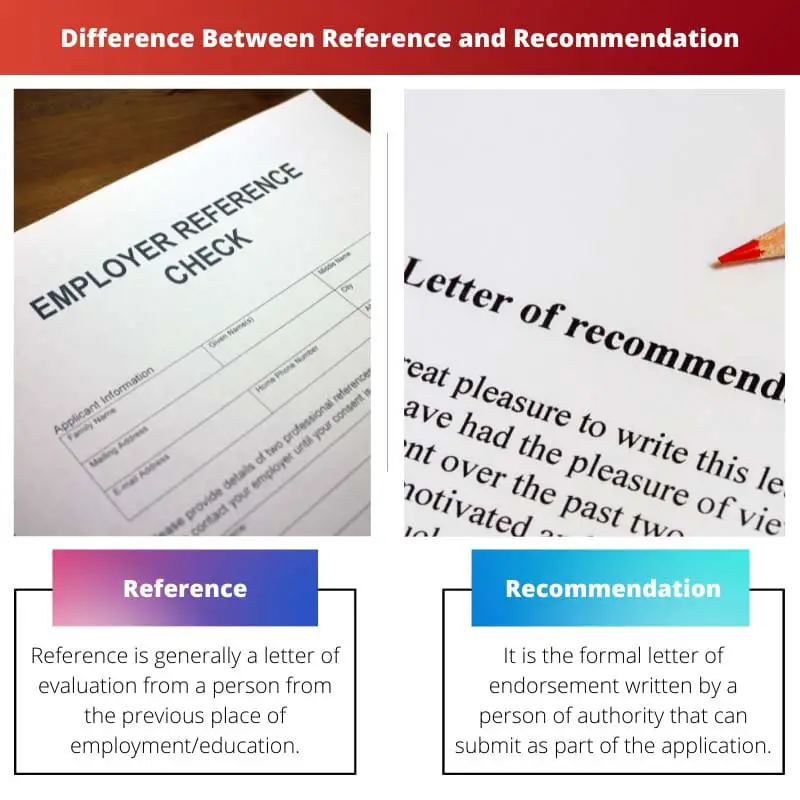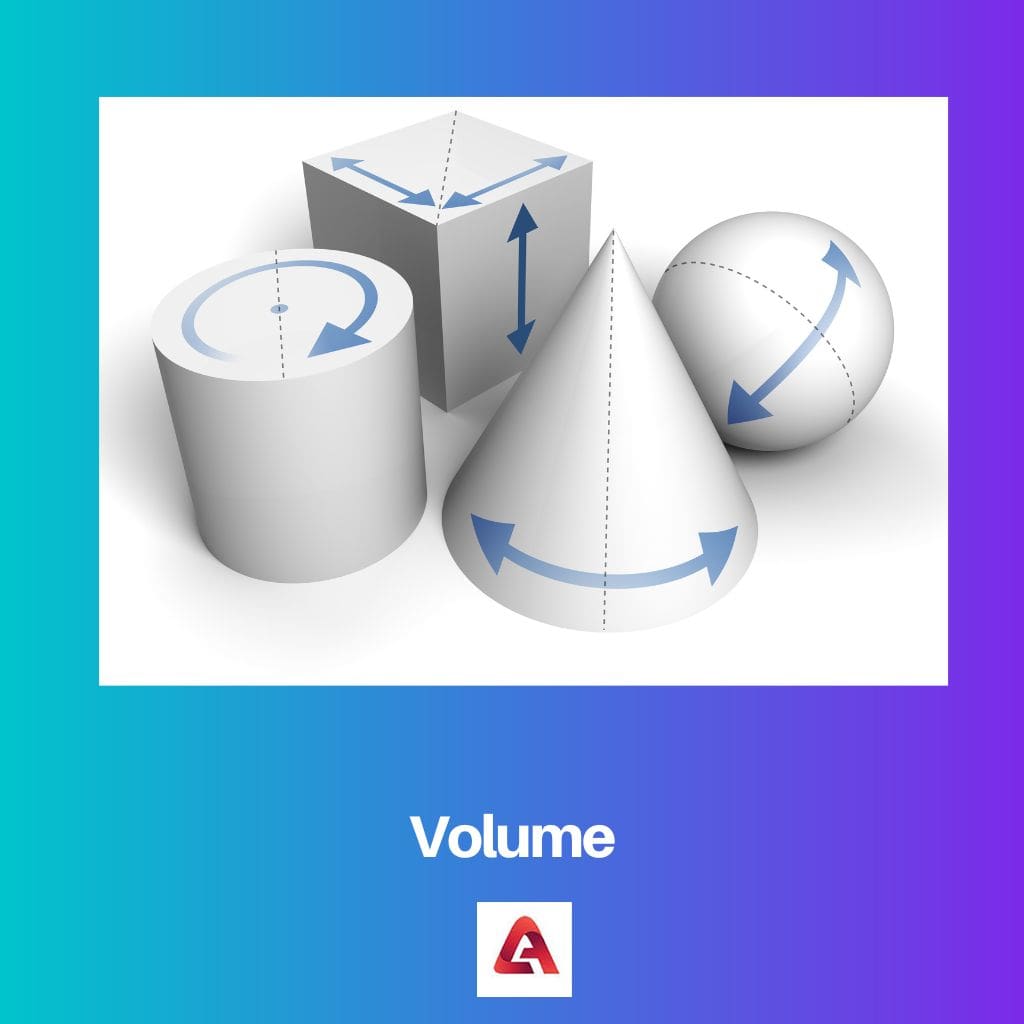A reference verifies past experiences or qualifications, in a professional context, providing specific examples and assessments. On the other hand, a recommendation involves actively endorsing someone based on their abilities or character, suggesting them for a specific opportunity or role, highlighting their potential impact.
Key Takeaways
- A reference is a statement or testimonial from someone who knows the subject (e.g., a job applicant) and can vouch for their qualifications, skills, or character. At the same time, a recommendation is a more detailed and personalized endorsement of the subject.
- References are more formal and limited in scope, focusing on confirming factual information, whereas recommendations comprehensively assess the subject’s strengths, accomplishments, and potential.
- Employers or institutions may request references to verify the information and gain insight into a candidate’s background. At the same time, recommendations are used to evaluate the candidate’s suitability and potential for success in a specific role or program.
Reference vs Recommendation
A reference is an evaluation document through which skills or characteristics of a person are being evaluated. A reference letter identifies the eligibility of the person for a particular post. Recommendation is a letter which can be given to the person by his/her former company. Recommendations can be of two types. A person’s skills and abilities are mentioned in a recommendation letter.

A recommendation is a letter of support for the credibility and qualification of a person offered by a previous employer/boss or a mentor/teacher.
Reference is also commonly used to indicate the persons who can be referred to check the qualifications and other important factors about a new or academic job applicant.
Comparison Table
| Feature | Reference | Recommendation |
|---|---|---|
| Purpose | To verify an individual’s skills, experience, or character. | To express positive support for someone’s candidacy for a position, program, or opportunity. |
| Content | Focuses on factual information about the individual’s qualifications and past performance. May include details on skills, experience, and work ethic. | Focuses on the individual’s strengths and suitability for the specific position or opportunity. Often emphasizes positive qualities and potential. |
| Source | Typically provided by someone who has professional or personal experience with the individual, such as a former employer, colleague, professor, or personal acquaintance. | Typically provided by someone who has positive experience with the individual’s work, character, or potential, and who believes they are well-suited for the specific opportunity. |
| Formality | Usually formal in tone and written in a professional manner. May follow a specific template or format. | Can be formal or informal, depending on the context and relationship between the recommender and the recipient. |
| Confidentiality | Can be confidential depending on the agreement between the individual and the reference giver. | Usually not confidential, unless the recommendation is solicited directly from the recipient. |
| Request | Often requested by the individual needing a reference for employment, education, or other applications. | Usually not directly requested by the individual but may be solicited by the recipient of the recommendation. |
What is Reference?
Purpose of References
References are primarily utilized to authenticate the claims made by an individual regarding their skills, achievements, and work history. They offer prospective employers, academic institutions, or other parties insights into the candidate’s capabilities and suitability for a particular role or opportunity.
Types of References
- Professional References: These references come from former employers, supervisors, or colleagues who can attest to the individual’s work ethic, performance, and skills within a professional setting.
- Academic References: Academic references are provided by professors, teachers, or academic advisors who can speak to the individual’s academic abilities, intellectual prowess, and potential for further education or research.
- Personal References: Personal references may come from friends, mentors, or community leaders who can vouch for the individual’s character, integrity, and personal qualities that may not be evident from professional or academic settings.
Components of a Reference
A typical reference includes the following components:
- Contact Information: Name, position, company or institution, and contact details of the person providing the reference.
- Relationship to the Candidate: Explanation of how the reference knows the candidate and the context of their relationship (e.g., supervisor, colleague, teacher).
- Assessment of Skills and Abilities: Detailed evaluation of the candidate’s strengths, weaknesses, skills, and competencies relevant to the position or opportunity.
- Character Assessment: Insights into the candidate’s character, work ethic, reliability, and suitability for the role or opportunity.
- Relevance to the Position: Commentary on how the candidate’s experiences and qualifications align with the requirements of the position or opportunity in question.
- Recommendation: A conclusion or recommendation regarding the candidate’s suitability or endorsement for the position or opportunity.

What is Recommendation?
Purpose of Recommendations
Recommendations serve to provide a strong endorsement of an individual’s capabilities and character, aiming to convince decision-makers of their suitability for a particular position, opportunity, or pursuit. They offer insights into the candidate’s strengths, achievements, and potential impact.
Types of Recommendations
- Professional Recommendations: These recommendations come from supervisors, mentors, or other professionals who can attest to the candidate’s performance, achievements, and skills in a professional setting. They highlight specific projects, accomplishments, or leadership qualities.
- Academic Recommendations: Academic recommendations are provided by professors, advisors, or mentors who can speak to the candidate’s academic abilities, intellectual curiosity, and potential for further education or research. They may highlight academic achievements, research projects, or intellectual prowess.
- Personal Recommendations: Personal recommendations come from friends, mentors, or community leaders who can vouch for the candidate’s character, integrity, and personal qualities. They may offer insights into the candidate’s values, interpersonal skills, and overall suitability for the opportunity.
Components of a Recommendation
A comprehensive recommendation includes the following components:
- Introduction: Identification of the recommender and their relationship to the candidate, establishing credibility and context.
- Assessment of Skills and Qualities: Detailed evaluation of the candidate’s strengths, abilities, accomplishments, and relevant skills, supported by specific examples or anecdotes.
- Character Endorsement: Discussion of the candidate’s character traits, work ethic, integrity, and suitability for the position or opportunity.
- Impact and Potential Contribution: Articulation of the candidate’s potential impact, contributions, and value proposition, emphasizing how they would excel in the given role or opportunity.
- Conclusion and Recommendation: A strong endorsement or recommendation for the candidate, expressing confidence in their abilities and suitability for the opportunity in question.
Importance of Recommendations
Recommendations carry significant weight in decision-making processes, as they provide third-party validation and endorsements of an individual’s abilities and character. They offer valuable insights beyond what can be gleaned from resumes or transcripts, helping decision-makers assess a candidate’s potential for success.

Main Differences Between Reference and Recommendation
- Purpose:
- Reference: Validates qualifications, experiences, and character.
- Recommendation: Actively endorses and advocates for an individual based on their abilities and character.
- Content:
- Reference: Provides factual information, focusing on past experiences and qualifications.
- Recommendation: Includes assessments of the individual’s skills, character, and potential contribution, with personal insights and anecdotes.
- Focus:
- Reference: Emphasizes verification of past performance and qualifications.
- Recommendation: Highlights the candidate’s suitability and potential impact for a specific opportunity or role.
- Provider:
- Reference: Provided by someone familiar with the individual’s professional or academic background.
- Recommendation: Typically given by someone who has worked closely with the individual and can offer a strong endorsement.
- Role:
- Reference: Serves as validation for a candidate’s credentials and character.
- Recommendation: Acts as a persuasive tool to support the candidate’s candidacy for a particular opportunity or role.





